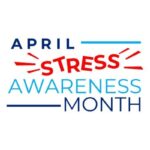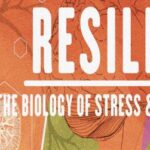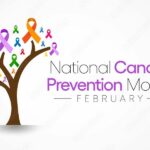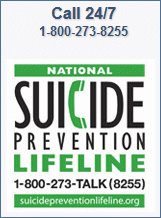Online Depression Assessment (PHQ-9)
Quiz-summary
0 of 10 questions completed
Questions:
- 1
- 2
- 3
- 4
- 5
- 6
- 7
- 8
- 9
- 10
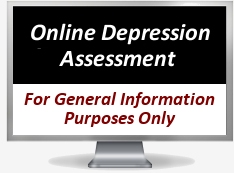 This online Depression Assessment is strictly for general information purposes and is not a substitute for an in-person clinical evaluation. The assessment is free & completely anonymous. You do not need to provide your name. The depression assessment takes about 5 minutes, and provides general feedback when completed. Please discuss any questions you may have with a physician, psychiatrist, or professional therapist.
This online Depression Assessment is strictly for general information purposes and is not a substitute for an in-person clinical evaluation. The assessment is free & completely anonymous. You do not need to provide your name. The depression assessment takes about 5 minutes, and provides general feedback when completed. Please discuss any questions you may have with a physician, psychiatrist, or professional therapist.
You have already completed the quiz before. Hence you can not start it again.
You have to finish following quiz, to start this quiz:
Results
Time has elapsed
You have reached 0 of 0 points, (0)
Categories
- Not categorized 0%
-
Depression Assessment Results
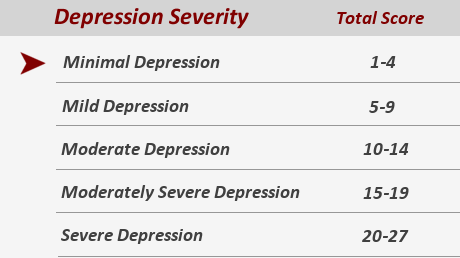
Minimal Depression: Your score indicates that you have experienced some signs of depression that typically fall in the minimal category of severity. It is fairly common for people to experience low moods or occasional feelings of sadness. These feelings do not necessarily interfere with one’s daily functioning or indicate a need for professional help. However, if you find that your depressive symptoms do not improve or if they should worsen, then it is recommended you seek an evaluation to determine if professional help is needed to resolve your symptoms.Question #9 pertains to having thoughts of potential harm to oneself or thinking one would be better off dead. If you answered “Several days” or more on this particular question, it is recommended that you seek professional help immediately for further assessment of your needs and safety. Depression can become quickly debilitating and interfere with one’s judgment, outlook, and decision-making. Please do not hesitate to call 911 or to visit you local hospital emergency room immediately if you are having thoughts of harming yourself.
-
Depression Assessment Results
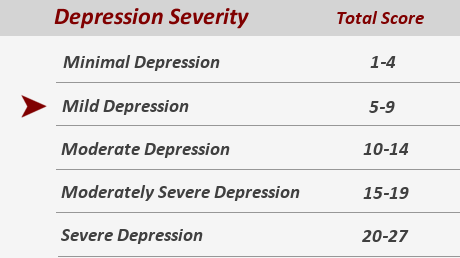
Mild Depression: Your score indicates that you have experienced some signs of depression that typically fall in the mild category of severity. The subjective feeling of “mild depression” may affect people differently. Some individuals may find that they can continue to function normally, while others may be unable to carry on with their daily activities as usual. The symptoms of mild depression may resolve naturally with time. However, this level of depression can also worsen with time if not addressed. Individuals whose scores fall in this range are recommended to speak to a professional about their depression and to explore ways they can improve their mood and reduce their depressive symptoms.Question #9 pertains to having thoughts of potential harm to oneself or thinking one would be better off dead. If you answered “Several days” or more on this particular question, it is recommended that you seek professional help immediately for further assessment of your needs and safety. Depression can become quickly debilitating and interfere with one’s judgment, outlook, and decision-making. Please do not hesitate to call 911 or to visit you local hospital emergency room immediately if you are having thoughts of harming yourself.
-
Depression Assessment Results
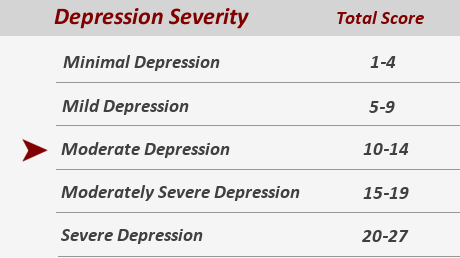
Moderate Depression: Your score indicates that you have experienced signs of depression that typically fall in the moderate category of severity. Moderate depression can be debilitating and can interfere with normal daily life in a number of ways. Often, this level of depression does not resolve naturally and will require support, lifestyle change, and/or professional help to properly evaluate the origin of the depression and a course of treatment to manage its symptoms. Moderate depression can affect general health, physical energy, mental concentration, self-esteem, relationships, and other aspects of life. It is highly recommended that any individual scoring in this category seek a professional evaluation as soon as possible.Question #9 pertains to having thoughts of potential harm to oneself or thinking one would be better off dead. If you answered “Several days” or more on this particular question, it is recommended that you seek professional help immediately for further assessment of your needs and safety. Depression can become quickly debilitating and interfere with one’s judgment, outlook, and decision-making. Please do not hesitate to call 911 or to visit you local hospital emergency room immediately if you are having thoughts of harming yourself.
-
Depression Assessment Results
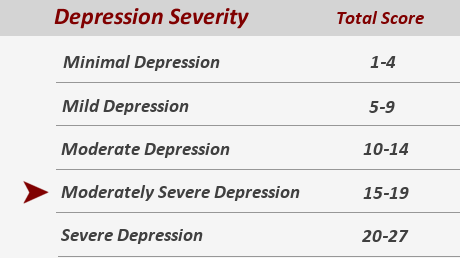
Moderately Severe Depression: Your score indicates that you have experienced signs of depression that typically fall in the moderately severe category of severity. Moderately severe depression is very serious and a clear signal that immediate professional help is needed. This level of depression may be the result of an imbalance in brain neurotransmitters which regulate mood. This can lead to chronic feelings of hopelessness and a breakdown in one’s ability to cope with stress, think clearly, or make rational decisions. Often, this level of depression does not resolve naturally and will require evaluation, support, counseling, and possibly medication therapy for some period of time.Since each person may vary dramatically in their subjective experience of moderately severe depression, each person’s treatment plan may also vary depending on their assessed needs and other factors. The most important step at this point is to seek help immediately, if you have not done so already. Moderately severe depression can affect general health, physical energy, mental concentration, self-esteem, relationships, and other aspects of life. Addressing and managing your depressive symptoms as soon as possible cannot be overstated. There is also a “Search For Treatment” link located below for identifying treatment providers in your local area, and the Suicide Prevention Lifeline contact number.
Question #9 pertains to having thoughts of potential harm to oneself or thinking one would be better off dead. If you answered “Several days” or more on this particular question, it is recommended that you seek professional help immediately for further assessment of your needs and safety. Depression can become quickly debilitating and interfere with one’s judgment, outlook, and decision-making. Please do not hesitate to call 911 or to visit you local hospital emergency room immediately if you are having thoughts of harming yourself.
-
Depression Assessment Results
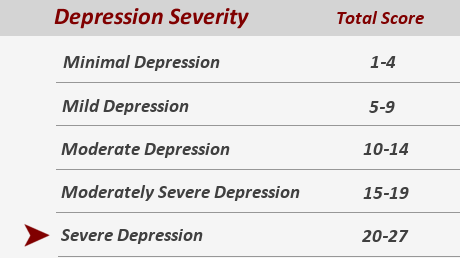
Severe Depression: Your score indicates that you have experienced signs of depression that typically fall in the severe category of severity. Severe depression is a serious cause for concern and a clear signal that immediate professional help is needed, possibly including crisis stabilization or hospitalization. This level of depression may be the result of an imbalance in brain neurotransmitters which regulate mood. This can lead to chronic feelings of hopelessness and a breakdown in one’s ability to cope with stress, think clearly, or make rational decisions. Severe depression does not resolve naturally, and points to the need for an immediate evaluation, support, counseling, and possibly medication therapy for some period of time.Right now, insuring your personal safety is of the utmost importance. Addressing your depressive symptoms as quickly as possible cannot be overstated. Please contact any family, friend, co-worker, or neighbor who can assist you in connecting with professional help today. You can also access emergency help by visiting the emergency room of your local hospital. If you are having any thoughts of harming yourself, you can call the 911 emergency number if you reside in the United States. There is also a “Search For Treatment” link located below for identifying treatment providers in your local area, and the Suicide Prevention Lifeline contact number.
Question #9 pertains to having thoughts of potential harm to oneself or thinking one would be better off dead. If you answered “Several days” or more on this particular question, it is recommended that you seek professional help immediately for further assessment of your needs and safety. Depression can become quickly debilitating and interfere with one’s judgment, outlook, and decision-making. Please do not hesitate to call 911 or to visit you local hospital emergency room immediately if you are having thoughts of harming yourself.
-
Depression Assessment Results
This is positive news! Your score is “0” suggesting that you are presently not experiencing clinical symptoms of depression.
- 1
- 2
- 3
- 4
- 5
- 6
- 7
- 8
- 9
- 10
- Answered
- Review
-
Question 1 of 10
1. Question
Waiver/Disclaimer Statement: I understand that this assessment is for general information purposes only. I understand that Alcohol and Drug Services (ADS) is not receiving my assessment results and that ADS has no duty or responsibility to act on my behalf. I understand that it is my personal decision to seek treatment services or not.
Hint
Site visitors cannot proceed with the assessment until he or she expresses agreement with the waiver/disclaimer statement. If you disagree with the waiver/disclaimer statement, please exit this part of the website. Thank you for your understanding!
-
Question 2 of 10
2. Question
Over the last 2 weeks, how often have you been bothered by any of the following problems?

Little interest or pleasure in doing things -
Question 3 of 10
3. Question
Over the last 2 weeks, how often have you been bothered by any of the following problems?

Feeling down, depressed, or hopeless -
Question 4 of 10
4. Question
Over the last 2 weeks, how often have you been bothered by any of the following problems?

Trouble falling or staying asleep, or sleeping too much -
Question 5 of 10
5. Question
Over the last 2 weeks, how often have you been bothered by any of the following problems?

Feeling tired or having little energy -
Question 6 of 10
6. Question
Over the last 2 weeks, how often have you been bothered by any of the following problems?

Poor appetite or overeating -
Question 7 of 10
7. Question
Over the last 2 weeks, how often have you been bothered by any of the following problems?

Feeling bad about yourself – or that you are a failure or have let yourself or your family down -
Question 8 of 10
8. Question
Over the last 2 weeks, how often have you been bothered by any of the following problems?

Trouble concentrating on things, such as reading the newspaper or watching television -
Question 9 of 10
9. Question
Over the last 2 weeks, how often have you been bothered by any of the following problems?

Moving or speaking so slowly that other people could have noticed. Or the opposite – being so fidgety or restless that you have been moving around a lot more than usual -
Question 10 of 10
10. Question
Over the last 2 weeks, how often have you been bothered by any of the following problems?

Thoughts that you would be better off dead, or of hurting yourself
> Search For Depression Treatment Now
Disclaimer: This online depression assessment is for personal use only and is not meant to be a comprehensive clinical evaluation. Please discuss any questions or concerns you may have with your physician or a clinical professional who specializes in the evaluation and treatment of depressive disorders.
 An online depression assessment is not intended to be a substitute for a professional in-person clinical evaluation. Assessing a depressive disorder typically involves a personal interview with a psychiatrist or professional counselor in order to learn the extent of a client’s depressive symptoms as well as possibly identifying the underlying causes or origin of the depression. A standardized assessment tool (depression symptom survey) is frequently used in conjunction with the in-person interview.
An online depression assessment is not intended to be a substitute for a professional in-person clinical evaluation. Assessing a depressive disorder typically involves a personal interview with a psychiatrist or professional counselor in order to learn the extent of a client’s depressive symptoms as well as possibly identifying the underlying causes or origin of the depression. A standardized assessment tool (depression symptom survey) is frequently used in conjunction with the in-person interview.
Managing depressive symptoms is typically achieved through cognitive/behavioral therapy and/or medication therapy. There are a variety of therapeutic approaches for helping individuals cope with chronic depression or work through depression that may be associated with life changing events or situational stressors.
There are many non-profit and private healthcare providers across the United States who specialize in the treatment of depressive disorders. Depression is one of the most common mental health conditions. Support groups are offered in most communities throughout the country with rural areas often having fewer resources than larger metropolitan cities. Antidepressant medication therapy is available through local psychiatrists and family practitioners who have a sub-specialty in treating psychiatric disorders.




